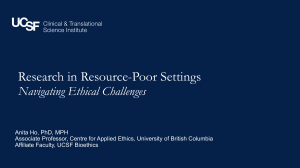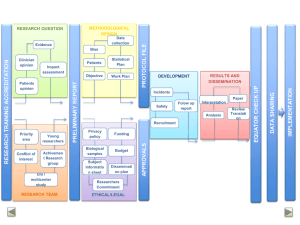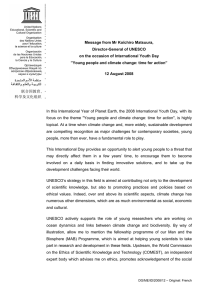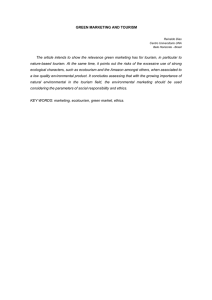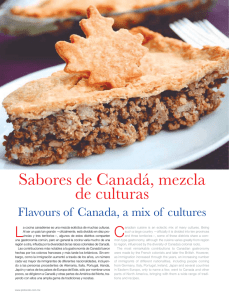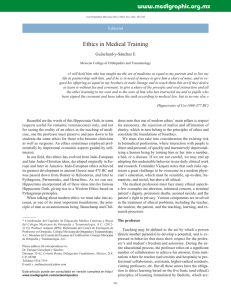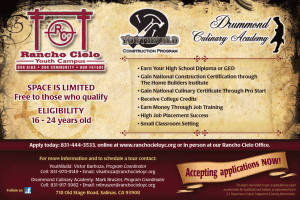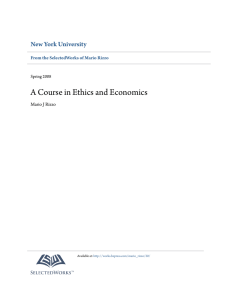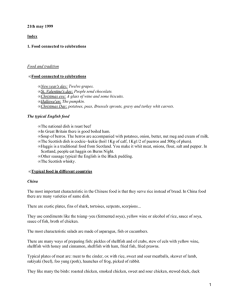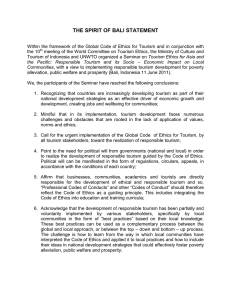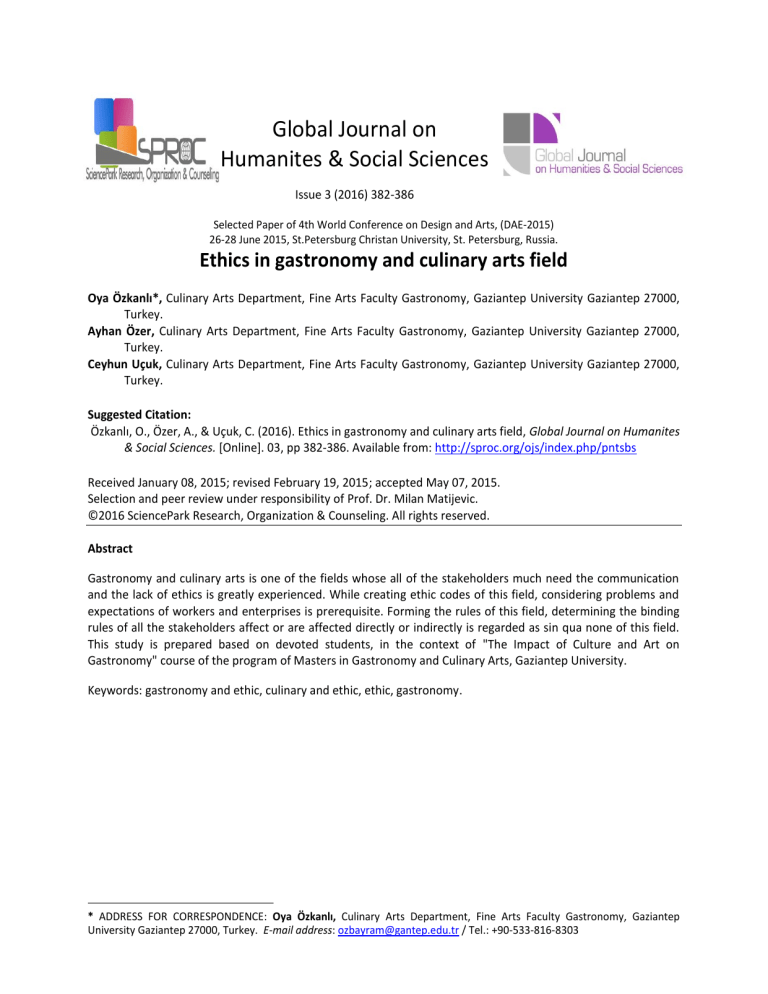
Global Journal on Humanites & Social Sciences Issue 3 (2016) 382-386 Selected Paper of 4th World Conference on Design and Arts, (DAE-2015) 26-28 June 2015, St.Petersburg Christan University, St. Petersburg, Russia. Ethics in gastronomy and culinary arts field Oya Özkanlı*, Culinary Arts Department, Fine Arts Faculty Gastronomy, Gaziantep University Gaziantep 27000, Turkey. Ayhan Özer, Culinary Arts Department, Fine Arts Faculty Gastronomy, Gaziantep University Gaziantep 27000, Turkey. Ceyhun Uçuk, Culinary Arts Department, Fine Arts Faculty Gastronomy, Gaziantep University Gaziantep 27000, Turkey. Suggested Citation: Özkanlı, O., Özer, A., & Uçuk, C. (2016). Ethics in gastronomy and culinary arts field, Global Journal on Humanites & Social Sciences. [Online]. 03, pp 382-386. Available from: http://sproc.org/ojs/index.php/pntsbs Received January 08, 2015; revised February 19, 2015; accepted May 07, 2015. Selection and peer review under responsibility of Prof. Dr. Milan Matijevic. ©2016 SciencePark Research, Organization & Counseling. All rights reserved. Abstract Gastronomy and culinary arts is one of the fields whose all of the stakeholders much need the communication and the lack of ethics is greatly experienced. While creating ethic codes of this field, considering problems and expectations of workers and enterprises is prerequisite. Forming the rules of this field, determining the binding rules of all the stakeholders affect or are affected directly or indirectly is regarded as sin qua none of this field. This study is prepared based on devoted students, in the context of "The Impact of Culture and Art on Gastronomy" course of the program of Masters in Gastronomy and Culinary Arts, Gaziantep University. Keywords: gastronomy and ethic, culinary and ethic, ethic, gastronomy. * ADDRESS FOR CORRESPONDENCE: Oya Özkanlı, Culinary Arts Department, Fine Arts Faculty Gastronomy, Gaziantep University Gaziantep 27000, Turkey. E-mail address: [email protected] / Tel.: +90-533-816-8303 Özkanlı, O., Özer, A., & Uçuk, C. (2016). Ethics in gastronomy and culinary arts field, Global Journal on Humanites & Social Sciences. [Online]. 03, pp 382-386. Available from: http://sproc.org/ojs/index.php/pntsbs 1. Introduction The purpose of this study is to lead to later works which will determine necessary ethical values which professional people must internalize; and rules they must obey, and the relationship between gastronomy and ethics. Moreover, this research is seen as a first step for these people to design the oath which may be appropriate for them. 2. Aim and Problem The problem of this study is the lack of ethical rules determined by contemporary approach of gastronomy which is connected with almost all people in one way or another. 3. Method and Limitation This research is a qualitative research with structured screening model. In this context, screening of ethical rules is done in existing different areas or forms. Furthermore, coming up with experimental design approach and questions to be discussed in the field limits the research by the realities of in its own. 4. Structure The term ethics derives from the Ancient Greek word ethos. Even though the word ethics is commonly used interchangeably with morality and both have resemblance in some respect, ethics is separated from the term of morality in many ways. Champion (2006) defines the term of ethics as the normative rules characterize the standard of professional groups and organizations, and the right or wrong behavior. It is possible to define ethics ‘to comply with the professional standards to regulate a certain profession, business or art with reference to Maxfield and Babbie’s (2005) Webster dictionary. Every job with his own laws. And it has more different and more certainty with some ordinary citizen. Doctor’s Hippocratic Oath’s soldiers, military discipline rules, priests connected to lots of rules it is include much more people who is not exempt. Kings should married with consider to government’s benefit but they do not consider to their own likes. Every each profession’s certain duties, partly ordered with rules and practice according to public opinion or partly profession. Therefore profession ethic’s studies explanations are very important (Russell, 2014:51). Ethics as a branch of philosophy has different branches, in appropriate form, different perspectives and opinions. Ethics; (UNITE 1 PROFESSIONAL ETHICS Introduction and Concepts Prof. Dr. Mahmut AYDIN) (1)Makes people well-behaved, conscious, productive and happy by achieving the place deserved in the society after educating them. (2)Provides the social and economic balance with mutual sensibility and confidence in the society. Ethics is defined as the standard of behavior which tells people- spouse, friends, parent, citizen, teacher etc.- how to react in many situations by the University of Santa Clara ,The Center for Applied Ethics(SCU, 2007). Creating the standard of ethics is a difficult process. This process contains two basis problems of which standards it is based and how to apply them in special cases. 383 Özkanlı, O., Özer, A., & Uçuk, C. (2016). Ethics in gastronomy and culinary arts field, Global Journal on Humanites & Social Sciences. [Online]. 03, pp 382-386. Available from: http://sproc.org/ojs/index.php/pntsbs Professional ethics directs behaviors in business and guide people about ethical principles and standards. Professional ethics is consisting of principles which command the members of profession, and oblige them to behave according to specific rules and limit their personal interests, and exclude the members of profession who are inadequate and unprincipled, and govern professional competition and aim to protect the ideal of services. Professional ethics are trying to find answers to questions about what people should generally apply or not while doing their jobs. The production of all kinds of goods and service needs of human being led to develop equal professional groups in the historical process. These groups created some principles in time. Ethics-moral values have an important place in these principles. Being in appropriate behavior to ethic values in business has several advantages or disadvantages. (http://kisi.deu.edu.tr//oguz.sarvan). The positive results of ethical behavior in business can be counted as follows: Gaining respect in the work environment Credibility in the workplace To have a good image in the business world To see convenience in the solution of problems encountered in business Quality management with ethical values and assisting the areas to manage such as; strategic planning To ensure the fulfillment of ethical values of social responsibilities of institutions in an orderly manner Ensuring the prevention of unfair competition with ethical values Acceptance in the business environment and so on. Code of professional ethics, in general, is expected to meet three basic functions: Ethical codes provide sharing the ideals of profession between society and professionals. Ethical codes ensure the development of acceptable standards to behaviors need to be disciplined and below the expected standards. Ethics codes are general guide to ethical behavior in profession life. Benefits that generated by this study are explained as follows. a. b. c. d. e. f. It motivates individuals to show ethical behavior by enabling colleague pressure. Instead of individual personalities, it provides a more consistent and stable guidance on the correct or incorrect actions. It guides on how to deal with uncertain situations. It controls the autocratic power of managers or bosses. It defines social responsibility of organizations. It serves the interests of the organization or profession. 384 Özkanlı, O., Özer, A., & Uçuk, C. (2016). Ethics in gastronomy and culinary arts field, Global Journal on Humanites & Social Sciences. [Online]. 03, pp 382-386. Available from: http://sproc.org/ojs/index.php/pntsbs 4.1. The Professional Oath of Gastronomy The Professional Oath was stated with people worked in this field before its content in the process of designing oath. The basic element of determining scope for professional groups is to confirm the connection between the food instead of the names of fields involving the food and food culture. Gastronomy and culinary arts is determined to contain the people involved in the production, food processing and sales of food, and the professional groups involved the academic and scientific works in the process. The text of oath is based on safety of food and culinary culture in the name of human health and rights. The terms of impartiality and geographical indication are decided to accept as basic principle in the researches in the fields of culinary like in human health protected with the laws and regulations. The professional oath is also aimed to have ethical and moral values. It is aimed to protect people’s eating habits suitable for their religion like for their health, and respect their choices for food, and protect the originality of cuisine lived with culture. I promise that by serving in the production, food processing, food industry and the field of food, nutrition and food culture, in the services of production of academic and scientific information and improving culinary culture; I do not allow any implementation and product even in near of kitchen which harms, threatens and will threaten people’s health and eating habits, and that I explain ingredients of meal by considering the right of knowing what is eaten and that I remain faithful the originality, cultural background, geographical indication of eating habits in my scientific and social researches and that I respect people’s eating habits related to their religion and choices and values. 4.2. The Ethical Rules of Gastronomy Preparing the rules of ethics in this research, the other’s professional groups’ ethical rules, Universal Declaration of Human Rights, 1593 The Law of Public Health, and 2023 Declaration of the Turkish Federation of Food Associations are referenced. Created the articles 5, 6 and 7 has been established on the basis of article 126 in 1593 The Law of Public Health. The ethical rules of gastronomy: a. Businesses should base on rules created by Food and Agriculture Organization of the United Nations. b. The right of individuals to access to safe good should not be interrupted under any circumstances. c. Businesses can place the ingredients in the rate specified by law. d. Businesses must develop a scientific strategy for sustainable food production and healthy consuming. e. Businesses should provide training on health information for employees working in the field, or ensure the employees to receive the training, and the ones who received specified training should run. f. Employees are obliged to inform the employer about the disease. g. Individuals whose infectious diseases are documented, or who visibly have open wound or skin disease should not be run until they prove their diseases are cured. h. Businesses must provide the right to their personnel set by the Labor and Social Security Law. i. Businesses must prove mastery or expertise of the personnel with the document. 385 Özkanlı, O., Özer, A., & Uçuk, C. (2016). Ethics in gastronomy and culinary arts field, Global Journal on Humanites & Social Sciences. [Online]. 03, pp 382-386. Available from: http://sproc.org/ojs/index.php/pntsbs j. Businesses must be based on food security, and create competition environment with regulations. k. Businesses are obliged to offer the menu items in same content and the same price to customers/guests. l. Businesses must take into account of beliefs and feeding types of individuals, and offer them choices in public invitations. m. Businesses must provide the right for people to equal services regardless of their disability. n. Businesses must not ask for something that does not deserve from customers. (Mandatory tips and dues side applications) o. The origins of the products should be specified. p. Businesses should not pull down the case of quality, and obtain unfair profit from sharing and content. 5. Result and Recommendations Gastronomy is a sector based on intensive labor relations. So, the volume of done work in this field depends on the workforce. Therefore, a large number of workers are working in the field. Oversupply of labor and the sheer number of people working in this field have led to the emergence of many problems. For this reason, people need for written norms to minimize these problems. That is why it is attempted to establish ethical rules of gastronomy in order to be a reference to the subsequent studies. In this prepared study for the ethical rules of gastronomy, the main conclusions are as follows: That the right of access the food is the most basic right The necessity of reached food's being healthy and edible Being unmeasurable of professional competence of many workings in the field of gastronomy Lack of qualified personnel in the field of gastronomy Being inadequate of regulations in the face of problems encountered in the sector. References Aydın, M. (2013) Introduction of the Profession Ethics and Terms. Aydın, İ. (2010). Ethics and Public. http://en.wikipedia.org/wiki/Gastronomy Russell, Bertrand. (2014). Ethics, Society, Politics. İstanbul: Say Publications. Tayfur, N. Baştaş, N. Barış, O. (2014) Nutrition and Dietetics Education in the World and Turkey, Dietitian’s Profession Ethics. (3.Press) Publisher: İstanbul Hatipoğlu Kuçuradi, İ. (2003) Ethic and Ethics. (2015) Turkish Food and Beverage Industry 2023 Declaration. 386
